

| Gergely Zöldi: | "This generation could do great things" |
A conversation with actress Réka Pelsőczy
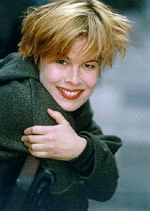 Réka Pelsőczy 51 KByte |
She grew up in an actor-family and has never had any doubts about choosing this profession herself. She is a member of the Katona József Theatre's company and we could also see her in the female lead of Portugal - the film version of one of her greatest stage successes. She is just over the premiere of Kornél Hamvai's Hangman's Holiday and she is already rehearsing the role of Martirio in Lorca's The House of Bernarda Alba. Let's talk about Portugal first, right? After all, that's the main reason for this conversation.We know that Andor Lukáts had directed this play first in the Kamra Theatre. When you first received the text, did you immediately see that this could be a great production? No, the way it happened was that I heard a gossip about getting this role - which was quite a surprise because I had never worked with Andor before in our theatre. I had no idea he even thought anything about me. So I was surprised. Then I read the play in the monthly Színház (Theatre) and I must admit I got even more surprised. I was in Leányfalu, I started to read with enthusiasm and I felt that it was written the way a complete outsider sees life in the country. What I withdraw now is that one cannot deny the text working well on stage. Egressy wrote the dialogues very well and humorously. Of course, Andor's world plays an important role in the stage version, I don't know who could have done this in such a manner. Who else feels so much for miserable people? How did you like the role itself? I immediately knew that I would be able to do it. When I looked at my role, it was clear that these words I could say well. I had no problem with that, really. I started to rehearse well, unlike in so many other productions where I had to fight with the text to make it fit me, to make it sound real. I knew at once how to say it - that's Egressy's virtue. Then, during the rehearsals I got to know more and more about the role and I started to look behind it. With my cynical brain I started to analyse the background of each of my sentences. So gradually the character became exactly like me. By the time my colleagues watched the performance all I heard from them was that it became a girl from Budapest. I had no idea what the problem was because the role took that shape gradually and I didn't recognise the change. Ági Szirtes helped me saying that I had started rehearsing well and I should bring back what I did at the beginning. She said that I need to play more simply, without thinking too much and my gestures need to be less sophisticated. She managed to put Masni in place within me. Are you able to see yourself realistically in a rehearsal period or performance? Do you see your own work and are you able to judge it? I think so. And I'm extremely interested in what the whole thing is like. I'm busy watching how the others are doing and how the other scenes are working. This excites me although I have no ambition to direct. Of course I have a female brain at the same time, when I'm reading a play I can't see it as a whole, I can only see what's before me. However, when we rehearse I can absolutely point out the mistakes. Let's talk about the film version of Portugal now! Had you had any film experience before? I only had small parts. I was in The Morel Boy and in Kornél Mundruczó's Desires I Have None, but I was cut out of the latter one. Besides these I only played in college projects. When I was fifteen I had a role in a TV-movie by Miklós Szurdi, which was an alternative adaptation of Stand Off. Otherwise I hadn't worked on film, I'm not even called to castings. Doesn't that bother you? It does because what I feel is that they don't even know I exist. It's funny because I always see that you are quite satisfied with your status. I'm happy that you say so because I can suffer and get disappointed a lot, feeling that the whole thing is completely senseless. Sometimes I ask myself why I'm like this? Of course my things have always worked out slowly, on a long-term basis. It was so when I wanted to join a certain community, in primary and secondary school. I thought that it would be different at the Theatre Academy but it wasn't. It was only in fourth grade that I could take the place I thought I should have. I feel the same in the theatre. I'm not the type that gets everything easy. I often get distressed because of this but I feel less and less envy for others - and I1m knocking this quickly on wood. I don't think that I'm not getting a role because of somebody else - all I can blame is myself. I also don't know if I could do well at castings. My head is very "changeable", I can look really awful, so I don't know if I could look my best. Many young actors complain about this in connection with castings. Yes, that's a horrible situation. All the same I feel that in theatre I have already passed that stage. As opposed to my academic years and my inhibitions there, at the there I knew that I had to pull myself together, step out on the stage in front of the audience without my knees trembling and I had to talk clearly. Does this only depend on a decision? For me it was the first relief after a deep depression. It was a long process, I knew that I had to cope with it but I couldn't. Then when I started to play in The Cherry Orchard at the Katona I saw that it had to stop. I saw that I couldn't afford it, which gave me enormous strength and I haven't had any problems with that notion since. Getting back to my original question: I asked about your film experience because shooting Portugal must have been a quite special situation for you as an actor. You played a role which had been yours on stage, so you must have had a routine about it. I thought about that a lot and we discussed that during the shooting - a doctor would prescribe this to everyone once in every ten years. You can play a role in a way that you don't have to work on it because you had had two months to elaborate it. Then you had a chance to try it out in front of an audience. So you don't have to consider what you should have in mind when you do this or that scene. For me this shooting was a whole month of euphoria. I found the camera extremely erotic. It stood there one meter from me and it saw everything I did - and I played only for the camera. So you had no difficulties? Some minor things, for example I had to pour the wine in a different rhythm than on stage - which mixed me up a little. And I didn't dare to do what every filmmaker says, that you must only play when the camera is rolling. I wasn't brave enough for that and sometimes I was better at the rehearsal than on film. It also happened that I certainly knew my part because I play in on stage, but my partner who is not in the stage production didn't. This meant that they put the third shot into the film, though I was better in the first one. Do you see in this film that as opposed to most of the shootings, here almost every actor knew exactly where his or her scene takes place in the whole story? That is, they are positive about what state of mind they should be in at the given moment. I don't think that necessarily shows in the film, rather on the actors. Still, I think that the stage version is more complete and it makes me a bit sad to see how little a film depends on the actors. Annie Girardot said somewhere that although she almost completely ignores the director in the theatre,. Probably she is genial. If she can afford it, let her do it. .when she works on film she very much depends on the instructions because she has no idea how her scenes will contribute to the whole film. I agree with her. And do you agree that one mustn't act on film because even what you think shows on the screen? Certainly. It's interesting that it worked quite naturally for me. Probably it's one of my disadvantages in theatre that I act in a minimalistic way. I'm not as theatrical as I'd like to be. After the film opened on the festival many people called me to congratulate - which was a great feeling - but some directly said that they liked me better on film than on stage. It's probably because what I do on stage is more effective on film. Although the Kamra is quite a small stage. Yes and still. On film you can only see what they show you. On stage you can watch whatever you wish. So on stage I'm becoming small beside Ági Szirtes. I sometimes wonder if I'm doing it wrong because I couldn't rise above the circumstances. I never felt that in the film. Sometimes it's bothering when you watch theatre performances on TV and you'd like to watch somebody listening to the others, but the camera shows the one speaking. That sometimes bothered me on location as well. I thought that the film would show things that only I can see during the performances. For example the faces of Ági Szirtes or Zoli Varga in closeup. Sometimes it did, but unfortunately not always. It clearly demonstrates that theatre is a much more communal and democratic genre - knowing that it certainly isn't its task to be democratic - whereas film is more aristocratic. This was Andor's work and I'm happy to have been a part of it, but it reflects his world and thinking. Do you mean that the same director worked differently with you on film? I could already see that during shooting. On the very first day I felt that film is like golf and theatre is like soccer. On film the actors are "kept clean", all they need to do is step before the camera, they are driven everywhere, taken care of, they have better accommodation than the others. It is not so in the theatre. Our shooting was a little different because for instance the set decorators came from the Katona, which created a good atmosphere. Do you feel better if you are not "babied"? Definitely. The dolly grip told me that he had had no idea that I was an actress because he had never seen an actress carrying weights before shooting and putting on curtains. He was positive that I was a prop master. I do very badly when I don't feel that I'm taking part in something. On the one hand I'm interested in the people I work with and on the other hand I can't stand the three-hour breaks between two shots. During these breaks I can't do anything else, I can't read a book or learn my lines - I like to make myself useful or at least watch the other actors' scenes. What were the reactions about the film like? I was lucky because after the first show my phone kept ringing till one a.m. and I got very nice remarks from very kind people. My mother, who is a quite reserved person, said that she started crying because so many people went up to her to praise me. So people liked the film despite its faults. For example the sound was not at all ready by the festival, the engineer didn't do anything with it for the set deadline. I really can't understand this amateurism. I hope the sound will be fixed by the movie premiere. Didn't you expect an award at the Film Week? I didn't. Although it was a big success, I didn't even expect an audience award. I think that it's impossible to flop at the Festival because people are so excited to see new pictures. As a matter of fact I did expect Ági Szirtes to get the award for Best Supporting Actress. I think what she did was fantastic - but she still didn't get the award. Some say that it's because it was considered as a film recreation of a stage performance. That's very mean to say because she played completely differently on film than in the theatre. She was even more astonishing. I couldn't believe that this miserable, disgusting creature was actually an actress. I know Ági very well, I'm familiar with each of her gestures on stage - maybe I'm a little too much under her influence -, but when I watched her performance in the film I thought that it was simply fantastic. Do you think the film will be a success? I don't know. Many people say that finally they saw a film that shows how to make comedy without being cheap and tasteless. That sounds promising because I agree. How satisfied were you with your own performance? I have always hated to watch myself on film. Then they brought the first print to the location and projected it onto the wall of the house on Somló hill, in which we stayed. On the first three days while they watched everything on video I never saw anything. I was horrified that I'd be sick of myself and freeze. During this viewing I suddenly heard the others laugh, I went closer - and I could completely separate myself from the person projected onto the wall. I saw a strange creature that was really a child but at the same time very feminine - I could look at her as a stranger. There wasn't a single take in which I thought I should have played differently. All through the film I felt that I'm doing everything I can now, with my age and my professional experience. I couldn't have done more now. Nothing you missed? There was one scene, the fight in the pub, that I dubbed differently than I did at the shooting. I used a more reserved tone - and I shouldn't have. The way I originally played it would have been the right style. You know, there's a scene in Árvácska, Zsuzsa Czinkóczi talking to Anna Nagy and standing up for "that's my shirt". She is not hysterical like an urban girl, she's incredibly tough - but tough in a very controlled manner - when she defends herself. I can't forget that, but still I couldn't do it in this scene. I keep looking for the way to play this. You mentioned that some colleagues blamed you for being too urban in the role. How can you, Réka Pelsőczy be a girl from Irgács at all? What does that take? That takes a lot of elements. Probably most actresses feel that way but I think that I'm much more diverse than what shows at the first glance. Normally people think that I'm a talkative, wild and tough girl when I'm totally different in fact. I have learned to protect myself that way. When, from whom and why? Probably at primary school where there was great rivalry for joining the "cool league". Can you remember the point when you decided to be this and that to achieve this? No, you gradually find out how you can win. A child tries out many things to find what is the best, what makes the others notice him or her. I think it's very difficult to communicate with strangers or even in the theatre and everybody has their own methods for it. For instance, I always wait for people to come up to me. It has never worked for me to go up to somebody. And do they come up to you? Always. That works. It seems that I have something to make them come up. And if I want to know somebody and they still don't come up then I start teasing and bullying them. This causes a lot of misunderstandings, many people have been offended - still that's the way it is, that's what determines what people think about me. But while I might seem frightening from the outside, I always wait for others to accept and love me. For a long time I did everything to achieve that. Now I'm starting to grow up and understand that I don't need everybody to accept and love me. That's true for my private and professional lives equally. So, getting back to being urban, I say about many roles that I could play them, because I am like that, too. I find it very exciting that although I don't look like an ingénue, if I played an ingénue-role that would make the whole thing more interesting. In Masni's role in Portugal, what was very close to me was her loving someone very much then being left alone. That was my first clue. On the other hand, we have a house in Kapolcs where I have met many villagers. I also spent a lot of time in the pub, I saw how life is there. And the third help came from Ági Szirtes, which I have talked about. But first of all, I always try to find in myself the character that I have to play. So, unlike Robert De Niro or Al Pacino, you don't need to study a lifestyle and observe a character similar to what you will have to play? I'd love to do that but I don't have the chance. Here in Hungary the whole thing doesn't work in a way that I know a year in advance what film I would make, then leave the business and concentrate on that single effort. I'm excited by the way they play and their methods are extremely close to me. I've been lucky, I have played most diverse characters during my career. I can't say that I'm stereotyped. But since I don't have the opportunity to use the above-mentioned method, I work from my experience. I'm interested in people and I collect them within myself. It's interesting that I build up a posture for each role that I get. I have a picture about the character that I will become. And what happens if the director has a different picture? I've been lucky so far, my directors have built upon my character, upon what I do. I have never bumped into such walls. They obviously have a picture of the role, but I can shape that quite flexibly. If the director asks for something completely different, I can be open to that, too. By the way, I'm very happy if I meet a director with clear ideas, but that's very rare. Can it happen that you add your own ideas to these ideas? For instance, was there place for that in the film version of Portugal? That wasn't my job there. But there were scenes that I asked Andor to cut out because they broke the rhythm of the film. Do you always see that so clearly? I watched this film as any viewer would. And as a viewer, I certainly wanted to see the best possible film. I feel the same in the theatre, I can sacrifice a very good sentence or even pages from my scenes in order to give the performance pace and rhythm. It also helps me if I feel that the text works and whatever I do is in place. No matter how wonderfully and movingly you weep on screen if the audience grumbles why the hell there's no cut. Such situations do me wrong because what they will remember is not how good I was but how bored they were by the film. My foremost aim is to make the whole thing work. That's when I can be good myself. By the way, I learned this from Gábor Zsámbéki at the Academy. We did a lot of scenes already in first grade but we only performed a few at the mid-term exams. Everybody fought for their scenes to be in the selection. And Zsámbéki said no, because the important thing is for the viewers to have a positive picture about the class. This proved for me that the point is not to make the audience watch undeveloped actors for five hours but to make them say, well, what a great class! I have heard this from many actors of the Katona. That's natural for me. I think that a performance can only be good if the ten or twelve people involved in it all want it to be. If even two don't want that or three have different ideas then I always feel during the performances that it's all wrong. Now that we're talking about your class, did you have a direct way to the Academy? I didn't. Although from the age of fourteen my problem was why I had to go to school at all, when my place should really be at the Theatre Academy. Then I went to the entrance exam pregnant, if I hadn't been they may have accepted me. Were you pregnant at the age of eighteen? I was. If somebody had said that earlier, I would have been the first to laugh. So I ended up trying to get into the Academy four times. Before my last entrance exam I missed theatre so much that I went to the Arany János Theatre, where János Ács was working. Ruszt, Ács and Metzner auditioned me for the studio but finally Ruszt gave me a contract for the Független Színpad (Independent Theatre). I worked there for a year, then I was admitted to Zsámbéki's class at the Academy. By then I had already accepted to become an actress without a degree. One thing I was sure of, that I would become an actress. By the way I have learned is that if I don't want something so hard then I get it much more easily. Then you became member of one of the best companies. The actors of the Katona are very often used on film as well. Yes, I think that this Kaposvár, late-National Theatre, Székely-Zsámbéki-Ascher-Ács group and school has educated a generation of actors that is really the top in the profession. I mean, whoever is on the top now comes from this school - with very few exceptions. For these people the profession is the single most important thing and it also means a sort of escape for them from life. That's very easy to take over and learn from them. I find it a little strange that we are talking about life while we strive to get away from it. How do you mean that? We run away from our family, from taxes, from meeting normal people. We live in the theatre. Péter Halász is right to say that it's not normal for an actor to only have role-lives. I agree with him, more and more of us do, but in the meantime, the morale that works in these people is definitive in the theatre profession and it's exemplary. It's important for us, young actors to take over the spirit they are working with. But you are at a disadvantage because there's less space to show your spirit. There are few films being made, all that remain are tasteless shows and commercials. Right, whereas film would be a great means because it is a genre of generations, it is capable of expressing the thinking of an age-group. I saw a show on TV where Pál Sándor gathered the most typical artists he had worked with a lot: Garas, Kern, Ragályi, György Illés. Someone said there that a film director basically works with people of his or her generation. It would be very important for us to show our problems. We must talk about what's happening to us - I, for instance find it depressive what's happening now in the world. For me, the previous generation's values are still more relevant. I find that the chaos that has been approaching for a while has reached its peak in our generation. Almost every minute I feel that I was born at the wrong time. I see enormously talented people around me who could do great things. Are you pessimistic in that respect? No. I think we are at a point where we can only go upwards. I believe that based on their gift, today's young artists deserve more than what place they take. For me it was a wonderful feeling in college to have such great classmates and I can still be proud of them. I appreciate all of them. Of course there can be a certain element of envy or rivalry between us - but I can't say anything bad about them professionally. So I try to be optimistic because I believe that this generation could do great things. Of course that also depends on us. |
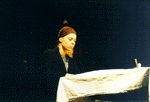 As Mother in Rozewicz: The Trap - d: Gábor Zsámbéki (Academy of Dramatic and Film Arts) 38 KByte | |
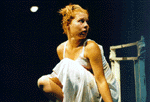 As Emilie in Brecht: Baal - d: Árpád Schilling (Katona József Theatre) 49 KByte | |
 As Lilo in Tankred Dorst: Mr Paul - d: Tamás Ascher (Katona József Theatre) 69 KByte | |
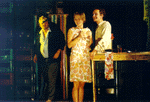 As Masni in Zoltán Egressy: Portugal - d: Andor Lukács (Katona József Theatre) 64 KByte | |
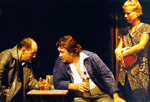 Zoltán Egressy: Portugal - d: Andor Lukács (Katona József Theatre) 74 KByte | |
 Andor Lukáts: Portugal (2000) 33 KByte |